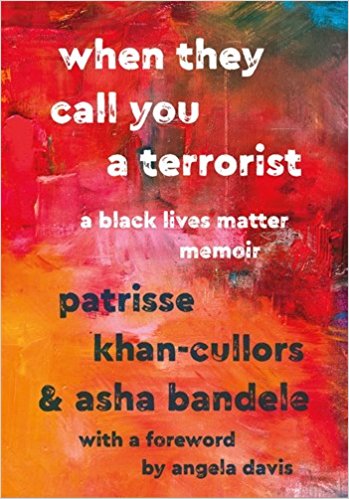Patrisse Khan-Cullors, a co-founder of the Black Lives Matter movement, is no stranger to resistance. Her searing new memoir, “When They Call You a Terrorist,” makes that plain.
Khan-Cullors, along with organizers Alicia Garza and Opal Tometi, created the call to action after the 2013 acquittal of George Zimmerman in the shooting death of Trayvon Martin, the Florida teenager Zimmerman killed as the adolescent walked alone back to his father’s home from a trip to a convenience store.
The author was the one to punctuate their grief with a three-word hashtag: #BlackLivesMatter.
Her story begins in Van Nuys, the largely Mexican Los Angeles neighborhood notorious for an overbearing police presence. Born third of four children, she writes of growing up as her mother worked 12-hour days and law enforcement constantly harassed her two older brothers.
When her brother Monte, just two years older, became a teen, he began exhibiting signs of schizoaffective disorder, which led to multiple stints of incarceration. During it all, his mental illness went mostly untreated. Reading about Monte’s struggle is heartbreaking and frames Khan-Cullors’ social justice work.
The author, now 33, became a community organizer in her teens. She benefited from a magnet high school that focused on social justice, and training through the Strategy Center – which helped partly demilitarize the Los Angeles police department in 2016.
At 272 pages, “When They Call You a Terrorist” is less a story about the Black Lives Matter movement than the day-to-day realities of living in a country where that declaration even has to be made. The co-founders and members of Black Lives Matter committed to 11 guiding principles, the first being that the United States must “end all violence against black bodies.”
“We are firm in our conviction that our lives matter by virtue of our birth, and by virtue of the service we have offered to people, systems and structures that did not love, respect or honor us,” Khan-Cullors writes. The three co-founders of the movement wanted their work to “spread like wildfire.”
 The movement, of course, has its critics. The “They” in the title refers to some entities, most notably the FBI, which listed “black identity extremists” in 2017 as a terror threat. Perhaps surprisingly, Khan-Cullors spends just a paragraph on her direct rebuttal: “Terrorism is being stalked and surveilled simply because you are alive. And terrorism is being put in solitary confinement and starved and beaten. And terrorism is not being able to feed your children despite working three jobs. And terrorism is not having a decent school or a place to play.”
The movement, of course, has its critics. The “They” in the title refers to some entities, most notably the FBI, which listed “black identity extremists” in 2017 as a terror threat. Perhaps surprisingly, Khan-Cullors spends just a paragraph on her direct rebuttal: “Terrorism is being stalked and surveilled simply because you are alive. And terrorism is being put in solitary confinement and starved and beaten. And terrorism is not being able to feed your children despite working three jobs. And terrorism is not having a decent school or a place to play.”
Once the movement took off, Khan-Cullors was miffed by the greater visibility men enjoyed that the founders did not. “Opal, Alicia and I never wanted or needed to be the center of anything,” she writes. “We were purposeful about decentralizing our role in the work. But neither did we want or deserve to be erased.”
In this way, she observes, history repeats itself: “…like the women who organized, strategized, marched, cooked, typed up and did the work to ensure the Civil Rights Movement, women whose names go unknown and unnamed.”
It is therefore disappointing that Khan-Cullors includes very little about her relationship with her co-founders, Alicia Garza or Opal Tometi, both before and during their public ascent. Perhaps she prefers that they speak for themselves, but her book would be stronger had readers been given a glimpse.
Still, “When They Call You a Terrorist,” co-authored with Asha Bandele, is stirring. The collaboration between the two feels organic, and the writing flows with an easy rhythm.
“I didn’t think I had a story inside of me,” Khan-Cullors told The Root. “Because oftentimes for black women, the role that has been relegated to us is to be the container for someone else’s story. We’re the partner, the extra in someone else’s tale.”